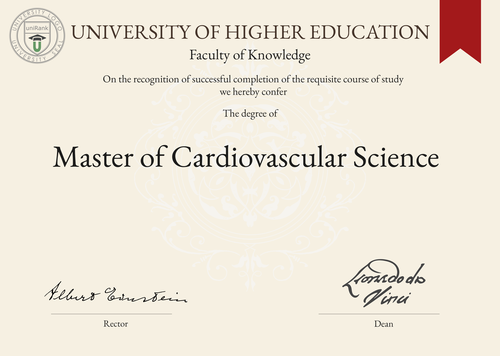
Master of Cardiovascular Science (MCS)
Guide to Master of Cardiovascular Science Program/Course/Degree
Master of Cardiovascular Science (MCS)

Degree Name:
Master of Cardiovascular Science
Degree Abbreviation:
MCS
Duration Range:
1-2 years
Tuition Range (US, UK, AUS, NZ):
$10,000-$50,000
Overview:
The Master of Cardiovascular Science degree is a postgraduate program that focuses on the study of the cardiovascular system. This degree is designed to provide students with a comprehensive understanding of the structure, function and diseases of the heart and blood vessels. Students will learn about the latest research and techniques in the field of cardiovascular science and will be equipped with the skills and knowledge necessary to pursue a career in this exciting and rapidly evolving field.
Curriculum Overview by Year:
- Year 1:
- Cardiovascular Anatomy and Physiology
- Cardiovascular Pathology
- Cardiovascular Pharmacology
- Cardiovascular Imaging
- Research Methods in Cardiovascular Science
- Year 2:
- Advanced Topics in Cardiovascular Science
- Cardiovascular Research Project
- Cardiovascular Clinical Practice
- Cardiovascular Epidemiology
- Cardiovascular Biostatistics
Key Components:
The key components of the Master of Cardiovascular Science degree include a strong foundation in cardiovascular anatomy, physiology and pathology, as well as an understanding of the latest research and techniques in the field. Students will also gain practical experience through clinical practice and research projects and will develop skills in critical thinking, problem-solving and communication.
Career Prospects:
Graduates of the Master of Cardiovascular Science degree can pursue a variety of careers in the field of cardiovascular science, including research, clinical practice and education. Some potential job titles include cardiovascular researcher, cardiovascular clinician, cardiovascular educator and cardiovascular consultant.
Salary Expectations:
The salary expectations for graduates of the Master of Cardiovascular Science degree can vary depending on the chosen career path and location. According to Payscale, the average salary for a cardiovascular researcher is $70,000 per year, while the average salary for a cardiovascular clinician is $100,000 per year.
For a more accurate understanding of salary expectations, you can utilize the Job Sites Search Engine, from our sister site jobRank, which searches over 4,600 job sites worldwide. Make sure to specify not only the job title but also the country you are interested in.Conclusions:
The Master of Cardiovascular Science degree is an excellent choice for students who are interested in pursuing a career in the field of cardiovascular science. However, it is important to note that the duration, tuition fees, curriculum, key components, career prospects and salary expectations can vary depending on the country and university where the degree is studied. Visitors can search for where this specific degree is offered anywhere in the world through the uniRank World Universities Search Engine.
World Universities Search Engine
search for Master of Cardiovascular Science (MCS) and add the Location (country, state etc.) or specific University you are interested in studying at.
Query examples:
- Master of Cardiovascular Science (MCS) United States
- Master of Cardiovascular Science (MCS) United Kingdom online
- Master of Cardiovascular Science (MCS) Australia international students
- Master of Cardiovascular Science (MCS) University of California
- Master of Cardiovascular Science (MCS) University of London tuition fees
- Master of Cardiovascular Science (MCS) University of Sydney scholarships
Share Program/Course
Interesting? Share this program/course/degree info with your friends now.